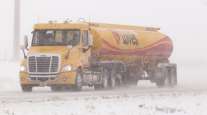Staff Reporter
Senate Bill Would Ease HOS, ELD Demands on Livestock Haulers

A bipartisan group of senators recently introduced a bill that would relax both electronic logging device and hours-of-service requirements for livestock haulers.
Sen. Ben Sasse (R-Neb.) led a group of fellow lawmakers in introducing the Transporting Livestock Across America Safely Act to the Committee on Commerce, Science and Transportation on May 23.
Introduced as S. 2938, the legislation states that HOS and ELD requirements would take effect only after a driver travels more than 300 air miles from his or her source. Current law mandates that drivers turn on their ELD devices after they cross a 150-air-mile radius.

Sasse
The bill also exempts loading and unloading times from the HOS calculation of driving time, allows drivers to rest at any point during their trip and permits drivers to complete their trip without heeding HOS regulations if they are within 150 air miles of their destination.
According to a press release issued by Sasse’s office May 23, the rigidity of current HOS laws jeopardizes the welfare of hogs, cattle, insects and other livestock.
“Nebraska’s economy runs on agriculture,” Sasse said. “Our ranchers and haulers are professionals who make the well-being of livestock their top priority, and that includes safe transportation. The Department of Transportation’s current regulations endanger livestock during hot summers and cold winters, which Nebraskans know well, causing significant stress on the animals and concern for the drivers. This bipartisan bill is good for our ranchers, good for our haulers and good for our livestock.”

Ernst
The purpose of HOS laws is to manage the amount of time drivers are on duty. The 14-hour driving window says drivers are allowed a period of 14 consecutive hours in which to drive up to 11 hours after being off-duty for 10 or more consecutive hours. Under S. 2938, these requirements would be shifted to a minimum of 15 hours and a maximum of 18 hours of on-duty time. Alongside Sasse, the bill’s co-sponsors were: Joni Ernst (R-Iowa), Heidi Heitkamp (D-N.D.), John Hoeven (R-N.D.), Doug Jones (D-Ala.), Jerry Moran (R-Kan.), Rand Paul (R-Ky.), Pat Roberts (R-Kan.), Marco Rubio (R-Fla.), Tina Smith (D-Minn.) and Jon Tester (D-Mont.).
“The transport of agricultural commodities, particularly livestock, poses unique challenges not faced by other segments of the trucking industry,” Ernst said. “The Transporting Livestock Across America Safely Act addresses these realities and the shortcomings of the current hours-of-service regulations by giving truckers the flexibility they need to get cattle, hogs and other live agricultural commodities to their destination.”

Martinez
ELD and HOS rules have long irritated many agriculture haulers. Currently, livestock haulers are operating under an exemption from the Dec. 18, 2017, ELD mandate that extends until Sept. 30.
Federal Motor Carrier Safety Administration Chief Ray Martinez told House Highways and Transit Subcommittee members May 22 that the agency would soon release new ELD guidance pertaining specifically to the agriculture sector’s concerns.
The bill has garnered praise from representatives of the agriculture sector, including leaders of the North Dakota Stockmen’s Association, the National Cattlemen’s Beef Association and the United States Cattlemen’s Association.
“We asked, and Congress answered. This is a historic moment for livestock and insect haulers to finally be afforded needed flexibility in the restrictive HOS rules,” United States Cattlemen’s Association Transportation Committee Chairman Steve Hilker said. “Thank you to everyone who has put in many hours, many miles and many late nights to get this piece of legislation brought forth to the Senate floor.”
We should not prioritize livestock over people’s lives.
Bill Sullivan, American Trucking Associations
Bill Sullivan, who leads advocacy for American Trucking Associations, advised against the legislation. He said such a law would be dangerous for truck drivers and all motorists.
“This bill would allow truck drivers to stay behind the wheel for almost twice as long as they’re permitted under the current hours-of-service rules,” Sullivan said. “It needlessly and recklessly jeopardizes the safety of people who travel our highways. We should not prioritize livestock over people’s lives, and ATA urges Congress to reject this misguided legislation.”




